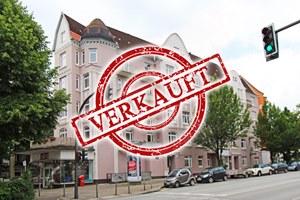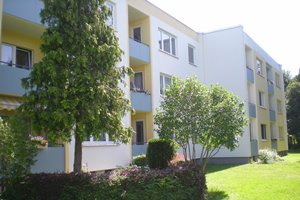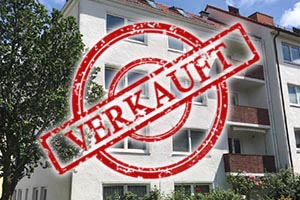
Are you now looking for an inflation-proof return on your assets? Do you want to fulfil your dreams within a few years – e.g.
- enjoy your dream holiday,
- own property or
- simply enjoy financial independence?
Are you toying with the idea of property? That’s sensible, because as a landlord you benefit from increasing rents – with a growing passive income from rent revenues!
GET:FINEO gives you personal, independent advice on the smart way to finance your property and let it without management costs.
Why bricks and mortar is concrete gold
Clear growth in value
Increasing rental incomes
Low-cost financing
Security as a capital investment
Would you like to know how to earn money by letting property?
In this free seminar, you’ll learn how to accumulate wealth with material assets:
Some of our clients’ properties as points of reference

Location: Lokstedter Weg, Hamburg-Eppendorf
Selling price: €233,000 – 737,800
Size: 48.30 – 240.94 sqm
Return: 3.23 – 3.74%

Location: Teichweg, Ammersbek
Selling price: €70,800 – 190,300
Size: 34.22 – 91.91 sqm
Return: 3.68 – 4.99%

Location: Reinholdstrasse, Hamburg-Harburg
Selling price: €134,200 – 194,800
Size: 46.28 – 64.60 sqm
Return: 3.47 – 3.97%
Letting flats vs. living in them
Should I really let out the flat I’ve bought, or would it be better to use it myself? Are you asking yourself this as well? Here’s a comparison between the two alternatives:
Let properties
Flats for personal use
(source: Süddeutsche Zeitung)
Costs of a buy-to-let property
What expenses will you have if you become a landlord? In reality these always differ, but nevertheless we’ve shown two specimen calculations of economic efficiency below (with and without equity capital):
€0 equity capital (plus ancillary costs) |
||
| Selling price | €245,375.00 | |
| Ancillary costs (approx. 7%), equity capital | €17,200.00 | |
| Total selling price | €262,575.00 | |
| Equity capital | €0.00 | |
| Loan amount | -€245,375.00 | |
| Loan interest | 1,80 % | |
| Floor area in m² | 65 | |
| Current rent per m² | €9.00 | |
| 1 | Rent (basic) | €585.00 |
| 2 | Interest | -€368.06 |
| 3 | Repayment (2% on annuity basis) | -€408.96 |
| 4 | Non-allocable costs | -€48.00 |
| 5 | Maintenance reserves | -€48.00 |
| 6 | Management of own property | -€29.00 |
Monthly total before tax |
-€317.02 |
|
| Income from Association of Independent Asset Managers (VuV) (sum of items 1, 2, 4, 6) | €139.94 | |
| Depreciation 2% p.a. (70% of selling price plus 100% ancillary costs) | -€314.94 | |
| Offset against tax | -€175.00 | |
| Tax benefit (at 38% tax rate) | €66.50 | |
Monthly total after tax |
-€250.52 |
|
€40,000 equity capital (plus ancillary costs) |
||
| Selling price | €245,375.00 | |
| Ancillary costs (approx. 7%), equity capital | €17,200.00 | |
| Total selling price | €262,575.00 | |
| Equity capital | €40,000.00 | |
| Loan amount | -€205,375.00 | |
| Loan interest | 1,80 % | |
| Floor area in m² | 65 | |
| Current rent per m² | €9.00 | |
| 1 | Rent (basic) | €585.00 |
| 2 | Interest | -€308.06 |
| 3 | Repayment (2% on annuity basis) | -€342.29 |
| 4 | Non-allocable costs | -€48.00 |
| 5 | Maintenance reserves | -€48.00 |
| 6 | Management of own property | -€29.00 |
Monthly total before tax |
-€190.35 |
|
| Income from Association of Independent Asset Managers (VuV) (sum of items 1, 2, 4, 6) | €199.94 | |
| Depreciation 2% p.a. (70% of selling price plus 100% ancillary costs) | -€314.94 | |
| Offset against tax | -€115.00 | |
| Tax benefit (at 38% tax rate) | €43.70 | |
Monthly total after tax |
-€146.65 |
|
€0 equity capital (plus ancillary costs) |
|
| Selling price | €245,375.00 |
| Ancillary costs (approx. 7%), equity capital | €17,200.00 |
| Total selling price | €262,575.00 |
| Equity capital | €0.00 |
| Loan amount | -€245,375.00 |
| Loan interest | 1,80 % |
| 1.80% | 65 |
| Current rent per m² | €9.00 |
| 1 Rent (basic) | €585.00 |
| 2 Interest | -€368.06 |
| 3 Repayment (2% on annuity basis) | – €408.96 |
| 4 Non-allocable costs | -€48.00 |
| 5 Maintenance reserves | -€48.00 |
| 6 Management of own property | -€29.00 |
Monthly total before tax |
-€317.02 |
| Income from Association of Independent Asset Managers (VuV) (sum of items 1, 2, 4, 6) | €139.94 |
| Depreciation 2% p.a. (70% of selling price plus 100% ancillary costs) | -€314.94 |
| Offset against tax | -€175.00 |
| Tax benefit (at 38% tax rate) | €66.50 |
Monthly total after tax |
-€250.52 |
€40,000 equity capital (plus ancillary costs) |
|
| Selling price | €245,375.00 |
| Ancillary costs (approx. 7%), equity capital | €17,200.00 |
| Total selling price | €262,575.00 |
| Equity capital | €40,000.00 |
| Loan amount | -€205,375.00 |
| Loan interest | 1,80 % |
| 1.80% | 65 |
| Current rent per m² | €9.00 |
| 1 Rent (basic) | €585.00 |
| 2 Interest | -€308.06 |
| 3 Repayment (2% on annuity basis) | -€342.29 |
| 4 Non-allocable costs | -€48.00 |
| 5 Maintenance reserves | -€48.00 |
| 6 Management of own property | -€29.00 |
Monthly total before tax |
-€190.35 |
| Income from Association of Independent Asset Managers (VuV) (sum of items 1, 2, 4, 6) | €199.94 |
| Depreciation 2% p.a. (70% of selling price plus 100% ancillary costs) | -€314.94 |
| Offset against tax | -€115.00 |
| Tax benefit (at 38% tax rate) | €43.70 |
Monthly total after tax |
-€146.65 |
Explanations
- In both cases, the ancillary costs of purchase must be financed from equity capital.
- Basic rent per sqm has been calculated according to the average rent for new lets in Hamburg.
- No liability is assumed for obtaining tax benefits. The depreciation in the sense of the Income Tax Act (EstG) has been calculated on the basis of the acquisition costs (selling price plus notarial and legal expenses for the deed of sale and land transfer tax). The final value is established during the assessment by the fiscal authorities. Rights to change, prior sale or error reserved.
- No liability is assumed for the accuracy of the property information supplied by the vendor.
- The financing conditions indicated are non-binding. They are roughly equivalent to the present financing conditions for a fixed interest rate of 10 years and a repayment of 2.0%, and are provided solely as an illustration.
Summary
Tip
Still not sure whether you could become a landlord?
You can find out everything you need to know about becoming a landlord at this free information evening:
Here’s how you can become a landlord with GET:FINEO
1. Be inspired by our concept
2. Learn more about whether it’s financially feasible
3. Choose from a selection of attractive properties
4. View selected properties with us
5. Find your ideal financing scheme with our help
6. Make our own independent decision
7. Buy your dream property with our support
8. Place the property management in reliable hands
9. Receive regular updates on your property
Our services for you
Creating an individual property concept
Fixed contact partner for:
- Property concept
- Financing
- Management
Free information evenings on the topic of ‘Becoming a Landlord’
Detailed presentation of suitable properties
Carrying out a quick financing check
Presentation of various financing instruments
Choice of various financing banks
Support during viewings, help with financing and completing the sale
Inclusion in an all-round financing concept
Insuring the rental:
- Insurance against loss of rent
- Tenants’ rights protection
Services for landlords:
- Management service*
- Letting service
- Tradespeople service*
- Tax consultancy service*
* Provided by external service providers
Management costs paid for one year cost-free!
What our customers say
Like to know whether your financing plan is feasible?
Arrange a free, non-binding, quick financing check with us here:
About GET:FINEO
About GET:FINEO
We give you all-round support in the areas of precautions, insurance, asset development and asset optimisation. To achieve this, our consultants, with their various areas of expertise, work for you hand in glove.
It goes without saying that GET:FINEO acts for you independently of any third-party interests, and doesn’t demand consultancy fees.
As one of our services, we offer you regular information evenings, e.g. on topics such as accumulating wealth with property, future trends or bequests & gifts.

Becoming a landlord with GET:FINEO – your benefits at a glance
Become a landlord now!
Your contact partner: Stefan Kühn
Your contact partner: Stefan Kühn

Since 2004 he has headed up the property department of GET:FINEO. Stefan Kühn helps his clients to become landlords, e.g. through information evenings on this topic.
He is the perfect contact person for you in all matters related to rental properties.
New customer offer
Your GET:FINEO experts can explain your custom-fit property concept for you. We also help you choose a property that matches your expectations and your budget. In addition, we help you with financing, completing the sale, and managing your property. In all of this, we always act independently of third-party interests.
Since we constantly give you all-round advice, you also learn about sensible insurance protection for a landlord or special tax arrangements. It goes without saying that our advice on these services is cost-free.
Other ways of contacting GET:FINEO
Große Elbstraße 14
22767 Hamburg, Germany
FAQ
Of course, the topic of ‘becoming a landlord’ gives rise to lots of different questions. You’ll find an answer to the most frequently asked questions here:
Can I also register my property for my own use later?
As the purchaser of a let property, you initially take over the existing rental agreement – which is normally for an unlimited period. Ultimately it is only in your interests to take on a reliable tenant if you want to generate rental income.
If this tenant moves out, then you can, for example, fall back on a short-term rental agreement. However, you must clearly justify this time limitation on the grounds of your own imminent need for the property. If the short-term agreement expires and, at that time, you want to move in to your own apartment, you no longer have to obtain a termination of agreement on the grounds of personal needs.
Can I have another property for my own use, in addition to one that is let?
Many of our clients have both rental properties and properties for their own use.
What happens to my financing plan if I become incapable of work or unemployed?
What extra costs might I be liable for as a landlord?
What happens when you lose rent because the flat is empty, the tenant can’t pay, etc.?
If your tenant is unable to pay the rent, your insurance against loss of rent covers the situation – which GET:FINEO will already have recommended to you at the time of purchase. If a legal dispute arises regarding a rent reduction, your landlords’ rights protection insurance will assume the costs for your lawyer. So you’re excellently protected.
What happens if I fall victim to a ‘fly by night tenant’?
But how likely is it that something like this will actually happen to you? In 2008, the German federal government registered less than 10,000 criminal complaints against such tenants, out of a total of 2.1 million new rental agreements in that year. That’s a quota of 0.5 per cent – and the trend is downward.
Do you have any other questions of your own? Then feel free to get in touch with us. We’re happy to give you advice – without charge, independently, and in all areas:
Becoming a landlord in Hamburg: How to do it right – with GET:FINEO
In the currently prevailing low-interest climate, your choice is mainly between material and tangible assets such as property, and shares.
Quite obviously, you’re interested in property. That’s hardly surprising:The low interest rates make financing property through a bank even more attractive.
Typical questions about ‘becoming a landlord’
Anyone who decides they want to become a landlord then benefits from numerous tax benefits compared with owner occupiers. The result? Your monthly costs are often lower than your repayment instalments.
Ifyou become a landlord in Hamburg – the much-loved metropolitan hub on the Elbe and Alster – your prospects of maximising your profits look particularly good. Hamburg’s rapidly rising rents work to your advantage as soon as you become a landlord.
If you’re considering becoming a landlord, lots of questions will be buzzing round your head. In the following article, GET:FINEO provides you with all you need to know to become a successful landlord in Hamburg.
Contents

Why does it pay to become a landlord?
Cash assets are completely exposed to deflation and inflation. Property, on the other hand, can withstand virtually any crisis.
But it’s not just their security that makes financial investments in property so attractive: With the current accommodation shortage in urban areas, you can expect a long-term increase in the value of your property.
As soon as you own a property, you’re also well placed for any future lending transactions. Banks regard you as creditworthy because you can declare your property as security.
You also profit from the tax benefits that letting a property brings with it: for example, you can partially offset costs for sale and maintenance against tax as advertising costs.
If you become a landlord, you generate an attractive revenue with an upward trend. As well as this, step by step you accumulate an additional source of income for today and tomorrow.
Is being a landlord more attractive than owner occupancy?
Living rent-free in your own home is an attractive prospect – particularly with a view to retirement. But from an investor’s point of view, being a private landlord is a more efficient way to accumulate wealth.
To put it briefly, this is due to two features: costs and choice.
If you become a landlord, you make long-term cost savings
- You can get 100% third-party financing for a property intended for rental use. (However, the ancillary costs of purchase are excluded – regardless of whether the property is let or for personal use.)
- Although it is true that you have regular expenses when you become a landlord, allocable costs affect the tenants, not you. These include, for example, operating costs such as street cleaning, waste disposal, insurance and ground tax.
- If you’re a landlord, after the sale you can write off 2% depreciation (AfA, Abschreibung für Abnutzung)against tax annually for your share of the building – that’s not possible with owner occupancy.
- Modernisation and refurbishment costs are also tax-deductible.
- Subject to certain conditions, costs for modernisation of the building can also be passed on to the tenants. After the work is completed, it’s even possible to increase the annual rent by up to 8 8% of the modernisation costs.This does not apply to repair or maintenance work.
- If you let a property privately in Hamburg, your rental income can end up exceeding the rent you have to pay yourself. That pays off!
As a private landlord, you have greater choice
Your revenue is directly dependent on a smart choice of location and the attractiveness of the residential building. And you have a more powerful influence on both these features if you become a landlord.
Because your own preferred location – whether it’s the region, the city or an urban district – or your personal taste in architecture and décor are irrelevant to you as a landlord.
You can live in an ultra-modern new building near your work in Pinneberg, while you become the landlord of an old residential property in Hamburg-Eppendorf – simply because this property possibly promises you a better income.
Moreover, as a landlord in Hamburg you have many more properties to choose from – including all properties that are already let and currently up for sale. If you buy a property that’s already let, take a look at the present and – if records are available – previous tenants:
- frequent changes of tenant give you a chanceto adjust the rental price.
- Long-term tenants, on the other hand, reduce the risk of rent loss.
You can let first and then move in later
It’s possible to become a landlord first but then move in yourself later on. Admittedly,you can’t do this immediately, and it’s subject to statutory regulations. Nevertheless, good preparation can make it possible.
It’s important to start thinking the matter over right now: Is this something that I or my family might consider? And how likely is it?
Here’s an example of a likely situation where you need the flat yourself: your daughter would like to study in Hamburg in a few years’ time, and could live much more cheaply in your 2-room Hamburg flat than in other rental properties.. Then using the flat yourself might probably be an option later on.
Personal need must be justified
If you or a family member have a fixed plan to use the property yourself later on, or it’s very likely, you should give detailed consideration to the matter of personal needs when you become a landlord.
Because simply writing ‘personal needs’ as justification when you terminate your tenants’ contracts is not enough. In a case like this, you need a plausible reason why you are registering it for our own needs, and for whom. According to the German Tenants’ Association, for example, this is only the case if you…
- register the flat for your own needs or those of your next of kin,
- the flat is occupied long-term and as principal residence,
- the residence is appropriate for these needs in terms of size and fittings, and
- no comparable flats are available in the same building.
Pay attention to the rental agreement
If you become a landlord and can justify your need for the property, you must still comply with the valid notice periods according to § 573 c BGB (German Civil Code). The longer the tenant has lived in the flat, the longer these notice periods are:
- under 5 years: 3 months’ notice
- from 5–8 years: 6 months’ notice
- more than 8 years: 9 months’ notice
For example, if you foresee a need for your flat in two years’ time and your tenant moves out now, afterwards you can fall back on a short-term rental agreement. However, you must justify this time limitation by the fact that you will soon need the property yourself.
If the short-term agreement expires and, at that time, you want to move in to your own apartment, you no longer need to make any termination on grounds of personal needs.

As a landlord, what do you have to look for when choosing a property?
Let’s assume now that you really want to become a landlord.To buy a property that ensures this will really pay off, one thing is important: you must consider your choice carefully before making it. Various factors play an important role on your choice: the location, the property itself and the revenue expected.
In all these matters, it’s worth seeking advice from a property expert. A bad buy is fatal if you become a landlord and want to use it to increase your assets.
If you want to buy a property for letting in a sought-after area of Hamburg, you’ll hardly get anywhere without engaging an estate agent. Test their competence using the check list below so that you don’t get any unpleasant surprises.
A good agent as your sparring partner
With the following GET:FINEO checklist you can find a reliable, qualified estate agent who will do more than just the minimum necessary:
- Does the agent ask you about your financial objectives? This includes checking your existing financial products. Because on the basis of their findings, a good agent can examine whether becoming a landlord really matches your goals and abilities.
- Does the agent check through your credit status with you? A good, reputable agent checks how things stand with your creditworthiness at any early stage. Because financing for your property can only be guaranteed if this is sufficient.
- Does your agent accompany you on viewings? One way you can tell a good estate agent is if they accompany you to view property you find attractive.
- Does your agent offer advice on purchase? Usually they already have some properties that offer attractive revenues in their portfolio. They can explain to you exactly which property is attractive for you as a capital investment – and why.
- Does your agent negotiate with the bank for you? A competent agent will accompany you to your bank appointments and negotiate the best interest terms for you. Because they know the market and can’t be deceived.
- Does your agent assume responsibility for finalising the financing for you? A good agent will take on the paperwork of the financing scheme with your bank. For you, that means: just lie back and become a landlord.
- Does your agent check options for cost reductions? You can tell a really good agent by their superlative knowledge of all the ins and outs of financial products. They will check whether existing financial products might be able to reduce your expenses.
- Does your agent explain the sales deed to you in easily understandable terms? Your dream estate agent will explain the deed of sale in such a way that you know exactly what you’re signing. Moreover they’ll accompany you to the notary and support you through all the formalities of the purchase transaction.
- After the sale, does your agent look after the letting process? A particularly good agent will not only give you tips on letting your property, but also – on your request – get involved in letting or management in a professional capacity, whether internally or externally.
- Can your agent offer you all-round financial advice? A tip on all-round service: don’t just choose someone who’s purely an estate agent, but someone from the all-round financial advice sector. These agents are more like consultants that can offer you various services and, for example, will know at once the most important insurance products for landlords.
An attractive location minimises your risks
If you want to become a landlord, choosing the right location is fundamental. Because location determines the size of your rental income. In this matter, therefore, it is essential that you should rely on the experience of a professional.
What makes a location ‘good’, then? The location of your freehold property should have a good reputation and good transport connections. If a location is well situated economically – e.g. offers a lot of jobs and has a good cultural facilities – that also speaks in its favour.
If you become the landlord of a property in a good location, then it’s easier for you to find interested tenants. Because the truth of the matter is: the more attractive the infrastructure is, the lower the risk of properties standing empty.
These features are also decisive for the value of the property in the long term – and the key word here is: resale.
Furthermore, through your choice of location you can exert a direct influence on future tenant populations. Because each target group has its own needs: while families need schools and crèches, good local public transport and proximity to doctors are the prime concerns for pensioners. If you prefer a particular target group of tenants, think about fulfilling their requirements.
A property in good condition reduces potential costs
If you want to become a landlord, and the location is suitable, the focus now switches to the property itself: How does it shape up in terms of condition, age, size, tenant mix and reliability of your potential tenants? Urgently required refurbishment measures or potential rent losses lead to unnecessary expenses.
You should get the property for sale assessed by experts:
- What is the overall condition of the building, and will it possibly need to be renovated?
- What is the energy standard – does it comply with the current Energy Saving Act?
- Does the insulation need to be checked?
Furthermore, you should check which decade the building was constructed in. Because there are certain flaws that are typical for specific dates of construction. You should also have these classic weak points assessed by an expert.
If the property is sold with sitting tenants
Could you become the landlord of a property that is already let? The advantage of this is, that rent is paid to you right from the beginning. By contrast, with a new building project you must pay costs up front without generating income.
Nevertheless, you should check the existing tenants very carefully. Check the previous owner’s rental agreement and ask them about their experiences with the tenant. If you’re not convinced by what you hear, either you shouldn’t buy the property, or you must obtain precise details of the notice periods within which you can terminate tenants’ agreements, so that you can find someone more reliable.
If you need a new tenant, a letting service, of the kind provided by certain agents such as GET:FINEO, can offer you support. Think about taking some of the pressure off yourself and reducing the hassle of letting.
Becoming a successful landlord: Profitability is decisive
So, you’ve found the right property, and now you want to become its landlord? Congratulations! However, before you buy the property to let privately, you should analyse its profitability.
The rent multiplier is a suitable tool for this. However, since only the selling price is factored into the equation, and not e.g. the ancillary costs of purchase, interest or management costs, the rent multiplier is only a rough reference point.
You calculate it as follows:
Rent multiplier = selling price: annual rent
Example:
- Price of property: 198,000 euros
- Basic rent per year: 6,000 euros
Rent multiplier: 198,000 : 6,000 = 33
According to this example calculation, you need 33 years to recoup the net selling price of your property.
What revenue can be achieved?
As soon as you become a landlord, you should get to know your future revenues. This is the only way to make long-term plans. To do this, you must compare the earning capacity of the property with the rental income.
The earning capacity consists of the selling price on the one hand, and the average costs for renovation, repair and management on the other. You need to investigate these factors over a specific time period. Tax benefits are also important.
The calculation method is as follows:
- Selling price + ancillary costs of purchase = investment costs
- Net basic rent (annual) – management costs (annual) – maintenance costs (annual) = annual net income
- Annual net income : investment costs = net rental revenue
Example:
- Selling price: 245,375 euros
- Ancillary costs of purchase: 17,200 euros
- Net basicrent (annual): 7,020 euros
- Management costs (annual): 348 euros
- Maintenance costs (annual): 576 euros
- Investment costs: 375 + 17,200 = 262,575 euros
- Annual net income: 7,020 – 348 – 576 = 6,096 euros
- Net rental revenue: 6,096 : 262,575 = 0.0232 x 100 =2.32%
2.32% is your net rental income in this example, but you only pay approx. 1.8% in interest to the bankfor your property loan.

What sort of costs does a landlord in Hamburg have to reckon with?
Becoming a landlord in Hamburg is an expensive pleasure at the time of sale, but it pays off in the long term. You can find out more about cost factors, the price situation in Hamburg and tax savings in the following section.
Acquisition and financing costs
The following costs and ancillary costs are incurred by you when you become a landlord:
- Selling price
- Ancillary costs of purchase
- Estate agent commission: in Hamburg, roughly 6.2% of the selling price
- Notarial fees for entry in land register: approx. 1% of the selling price
- Costs for land register entry: approx. 0.5% of the selling price
- Land transfer tax: in Hamburg 4.5%
- Ancillary costs of financing
- Interest: the debit interest for the granting of property credit must be paid annually. However, the actual costs of the property loan are revealed by the effective rate of interest. This indicates the total amount that the borrower must pay annually for their property financing scheme, and it can vary widely.
- Repayment: The monthly instalments for an annuity loan are made up of an interest component and a repayment component. The credit instalment itself remains the same, while the repayment component increases.. The repayment component becomes increasingly higher because the loan amountissimultaneouslyreduced by the repayment amounts already made.
Property prices: Becoming a landlord in Hamburg
The ancillary costs of purchase are directly related to the selling price. If you know the selling price, you can estimate the ancillary costs. So would you like an idea of what your private rental property in Hamburg would cost?
Property prices have been constantly increasing since demand began to increase in 2010. From this year on, interest in buying property has been constantly growing among investors and private individuals.
The reason? The lack of alternative investments in the current low-interest climate. In certain regions of Germany, property prices have risen by 60% or more since then. The boom has been helped by low construction interest and the stable economic situation in Germany.
The upshot of this situation has been high selling prices per square metre in sought-after locations. But don’t be scared off by this upward trend in prices. Becoming a landlord can be attractive for precisely this reason – in other words, because of thesustained increase in value of your property. If you resell in a few years’ time, you could reap a very good profit.
Prices per square metre in Hamburg, 2019
Here are some details of current prices (from 2019) for landlords in Hamburg: The average price per square metre is 4,483 euros. That’s 4.2% more than in the previous year. Moreover, in 16 of the 70 city districts investigated, the average price was over 5,000 euros.
The absolute front runner is Harvestehude, at 8,634 euros. It is followed, at some distance behind, by the HafenCity at 7,974 euros.
You can find properties for around the average value cited above in Alsterdorf, Eilbek or Hummelsbüttel.
In the extreme west of Hamburg – in Osdorf, Eidelstedt or Schnelsen – you pay less. Here you can find comparatively low average prices of around 3,200 euros per square metre.
On the other hand, if you’re attracted by the idea of becoming a landlord in the areas around Hamburg, then you should calculate on the basis of an average 2,295 euros per square metre. Right on the edge of the Hamburg metropolitan area – for example in Elmshorn – you can reckon with prices of less than 2,000 euros per square metre.
Becoming a landlord: Letting and maintenance costs
If you become a landlord, then you also assume certain responsibilities. You have to look after management, letting, modernisation and refurbishment work or organise them through third parties, and take on a share of the costs as well.
However, you should also know which of the costs you incur can be passed on to the tenants. However, this must be explicitly agreed in the rental agreement. Otherwise, the Operating Costs Regulation stipulates which of the operating costs of a residence are transferable – and which aren’t.
In all cases, what is important are either concrete formulations in the rental agreement or references to the legally stipulated Operating Costs Regulation (BetrKV), in particular § 2 of the Regulation. Because this lists all the items that can be passed on as operating costs.
Tax benefits as a landlord
As soon as you become a landlord, you can offset the following items related to your property against tax:
- Property advertisements for finding tenants
- Agent commission for tenant searches
- Mortgage interest
- Acquisition and procurement costs for the property: e.g. 2% depreciation (AfA) on your share of the building over 50 years
- Account holder fees for your letting account
- Furniture (in the case of furnished accommodation)
- Builders’ fees for repair and renovation work
- Ancillary fees as advertising costs
- Travel expenses in connection with the property to let
- Costs for lawyers and tax advisors
- Members’ subscriptions for associations
- When the property is empty: the incurred costs mentioned above can be claimed even when there is no rental income

How you can you protect yourself in your role as a landlord?
In many areas, good protection is essential if you want to enjoy peace of mind as a landlord. Find out below how you can safeguard yourself against specific risks.
How do you protect yourself from ‘fly by night’ tenants?
This is the nightmare scenario that landlords fear, so it should be pointed out right from the start: There are many fewer tenants of this kind around than you think. The percentage is around 0.5% – and falling. Above all, if you’ve taken on an existing tenant along with your property, and asked the previous owner about their reliability, the risk is minimal.
Nevertheless, for your own protection you might take note of the following points. They apply before you take on a new tenant, and serve to protect you against ‘fly by night’ tenants as a landlord in Hamburg:
Take precautions by carefully checking potential tenants before you suffer rent loss from unreliable ones:
- Check their identity using their ID card.
- Ask tenants to provide information about themselves, so that you can get an idea of their creditworthiness etc.
- Ask for an up to date SCHUFA credit report, and make sure the values are positive.
- In the case of employees: You can ask them to present their last three pay slips and thus make sure than the rent and ancillary costs do not account for more than 40% of their net income and that their probation period is over.
- In the case of self-employed people: Here you ask for the last two tax statements and a certificate from their accountant
- Ask the previous landlord for certification that they have no rent debts. If this is positive, you are probably not dealing with ‘fly by night’ tenants.
- Ask them to provide a deposit of three months’ rent – this is standard practice.
How can you protect yourself against rent losses?
As soon as you become a landlord, protect yourself against rent losses in advance by carefully selecting tenants. Of course, even reliable tenants who are generally willing to pay may sometimes get into difficulties with payment.
As a landlord in Hamburg, therefore, you should take out a rent loss insurance policy (Mietausfallversicherung). These are also called by other names, such as ‘Mietverlustversicherung’ or ‘Mietnomadenversicherung’. If you have one of these, you’re insured against financial losses incurred through missing rent payments. You can also take out protection against property damage.
In the case of a loss event, the insurer pays the amount of the unpaid rent to the landlord. In this way, you can completely avert the risk of suffering serious loss of income as a landlord through missing rent instalments.
How do you safeguard the building against damage?
The forces of nature can cause significant and expensive damage for you as an owner.
Luckily,building insurance against damage from fire, water, storm or hail is legally prescribed for every building. If you buy a property in an apartment building, this insurance will already be in place. The manager of the residentialbuilding can provide you with details of this.
How can you secure your financing scheme against unemployment etc.?
As a private landlord in Hamburg, your economic survival can depend on successful financing. You have the following options for ensuring that you can hang on to your dream of becoming a landlord even in hard times:
- Term life insurance: This will safeguard your family. The sum insured should at least equal the amount of the property loan. The term chosen must last until the credit has been completely repaid. This type of insurance is available from just a few euros a month.
- Occupational disability insurance: Almost one in four Germans will become unable to work for health reasons over the course of their lives. This type of insurance makes sense because statutory incapacity benefit can only replace a small fraction of the income that you rely on.
- Daily sickness allowance: This fills the gap in provision if you’re sick for longer than six weeks. This gap is particularly sizeable in the case of higher income earners.

Should I become a landlord in Hamburg? Draw your own conclusions!
You’ve now heard many arguments in favour of becoming a landlord: Property is an outstanding, inflation-proof capital investment. As a landlord, you benefit from numerous tax benefits and can finance up to 100% of your property from third-party sources – at currently attractive interest rates.
On top of this, you now know many tips on the subject of ‘becoming a landlord’. For example, you now know what you must look out for when buying:
- You need a good agent to support you.
- You should find an attractive location.
- Your property must be in good condition and the present tenants must be reliable.
- Your dream property should yield a good income.
Additionally, you have an idea of the costs you would incur as a private landlord in Hamburg and know how to safeguard yourself against all the risks involved in letting, property and financing.
Are you ready? GET:FINEO is ready too!
By now you’ve probably made your final decision, and want to become a landlord in Hamburg. You shouldn’t go it alone! The right choice of property, competent financial management or insurance protection as a landlord – these things are too important.
Rely on experts and hand over a share of your responsibilities to them – that way, you’ll enjoy becoming a landlord even more.
If you want support from all-round experts, then you’re in just the right hands with GET:FINEO. The all-round, independent financial consultants from Hamburg will support you in all financial matters. We’re much more than ‘just’ estate agents:
- We at GET:FINEO can identify whether properties fit in your portfolio – and if they don’t, we’ll also advise you against it.
- The consultants at GET:FINEO support you from the time you start considering the matter right up to any potential resale of your property.
- We know the Hamburg property market, because we’ve been local experts for decades.
- GET:FINEO carries out a quick check to see if you’re suited to financing from a bank.
- Our consultants search for the best financing scheme for you and for ways to reduce costs.
- GET:FINEO supports you in choosing property, during the sale and with the financing process.
- We know the right insurance protection for landlords and advise you in cases of loss.
- GET:FINEO offers a letting service in case you’d rather leave it to us to search for tenants.
- On request, we can recommend third-party services to you, e.g. for management or building work.
- GET:FINEO gives you all-round support with your finances – even beyond your buy-to-let property financing.
But get to know us first – free of charge and without any commitment. Form your own impressions, and arrange a consultation with GET:FINEO now:
| © 2019 GET:FINEO GmbH & Co. KG |



